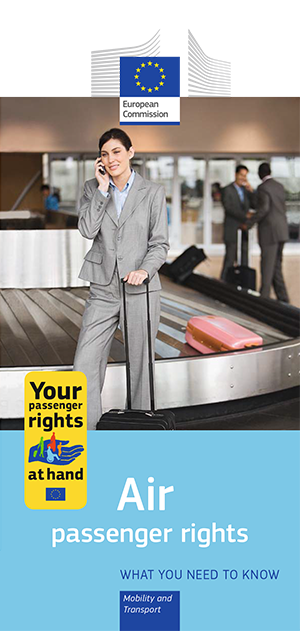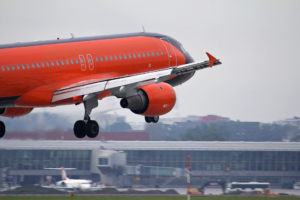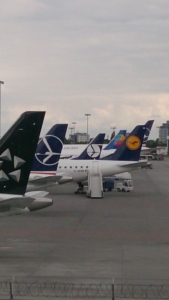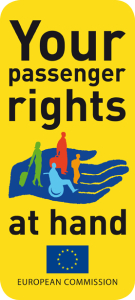 FAQ on air passenger rights
FAQ on air passenger rights
Below you can find the answers to some frequently asked questions on air passenger rights.
To which countries and which airlines do EU air passenger rights apply?
The rights set out in EU Regulation (EC) 261/2004 apply if:
- we fly out from any country in the European Union by any airline;
- we arrive to any country in the European Union on airlines registered in the European Union (or Iceland, Norway and Switzerland).
My flight was cancelled. Do I have a right to compensation?
 Passengers are entitled to compensation between € 125 and € 600 depending on the distance of the flight. Passengers are not entitled to compensation if the airline can prove that the cancellation was caused by extraordinary circumstances (weather conditions, strikes, security measures).
Passengers are entitled to compensation between € 125 and € 600 depending on the distance of the flight. Passengers are not entitled to compensation if the airline can prove that the cancellation was caused by extraordinary circumstances (weather conditions, strikes, security measures).
Regardless of compensation airlines must offer a choice between:
- re-routing to a destination on similar terms, or
- ticket costs refunded within seven days
- and, if necessary, care (phone, drinks, food, accommodation, transportation to the place of accommodation).
My flight was delayed. Do I have a right to compensation?
 If a passenger arrives at the destination with a delay of 3 hours or more he/she is entitled to compensation between € 250 and € 600, unless the carrier can prove that the delay was caused by extraordinary circumstances (weather conditions, strikes, security measures). Additionally, airlines can be held liable for damages resulting from the delay.
If a passenger arrives at the destination with a delay of 3 hours or more he/she is entitled to compensation between € 250 and € 600, unless the carrier can prove that the delay was caused by extraordinary circumstances (weather conditions, strikes, security measures). Additionally, airlines can be held liable for damages resulting from the delay.
The traveller also has the right to care (telephone calls, drinks, meals, accommodation, transportation to accommodation) if the delay is:
- 2 hours or more for flights up to 1,500 kilometres;
- 3 or more hours in case of longer flights within the European Union or other flights between 1,500 and 3,500 kilometres;
- 4 or more hours for flights of more than 3,500 km distance outside the European Union.
If the delay is more than 5 hours, and the passenger has not decided to continue the journey, he/she is entitled to a ticket refund.
I was refused boarding the plane. Do I have a right to compensation?
Passenger is entitled to compensation between € 125 and € 600, depending on the flight distance and time of arrival to destination. Additionally airlines are obliged to provide passenger with care, e.g., food, phone access, hotel accommodation and transportation to the place of accommodation.
Do I have a right to compensation if I was late for the connecting flight because of the delay of the first flight?
Passenger is entitled to compensation if the total delay at arrival to destination is longer than 2 hours, unless the airline can prove that the cancellation was caused by extraordinary circumstances.
What are extraordinary circumstances beyond the effective control of an airline?
It is not always the case that the delay or flight cancellation is due to the fault of the carrier. Extraordinary circumstances beyond the effective control of an airline include extreme weather conditions, political unrest or strikes. If either of these circumstances was the reason for the delay or cancellation the passenger is not entitled to compensation.
What does the term obligation to provide care mean?
 The passenger has the right to receive care from the airline (i.e. Access to the phone, rest, food, accommodation, transportation to accommodation) if the delay is:
The passenger has the right to receive care from the airline (i.e. Access to the phone, rest, food, accommodation, transportation to accommodation) if the delay is:
- 2 hours or more for flights up to 1,500 kilometres;
- 3 hours or more for flights within the European Union of more than 1500 km and all other flights between 1500 and 3500 kilometres;
- 4 hours or more for flights outside the European Union of more than 3500 km.
If the delay is greater than 5 hours, the passenger, who chooses not to continue the journey, is also entitled to ticket refund. If the flight is delayed by at least three hours, passengers are entitled to the same compensation as that granted in the case of a cancelled flight, unless the airline can prove that the delay was caused by extraordinary circumstances. Additionally, airlines can be held liable for damages resulting from delays.
Under what circumstances do passengers have the right to reimbursement for accommodation?
In a situation when the flight is delayed to the next day, passengers have the right to receive hotel accommodation and transport between the airport and the hotel. If the airline has not provided accommodation, passenger should take care of hotel accommodation on his own and ask the airline for a refund (note: the right to reimbursement of accommodation is available for standard rooms only).
What does code-share flight mean?
The code share flight means that between at least two airlines there was a code sharing agreement signed under which airlines jointly share the flight code and service the same flight. Ticket for a seat can be sold by the airline A, which entrust the management of thee flight to another airline B and on the ticket of an airline A the notice that the flight is operated by airline B may appear. Within the EU, code sharing practice is commonly used and have an impact on the right to compensation in accordance with Regulation 261/2004/EC (e.g. In the case of a delay of over three hours for flights to the EU, it is important that the operating carrier is registered in an EU country
What are the rights of passengers with disabilities and reduced mobility?
EU legislation protects people with disabilities and with reduced mobility against discrimination during making a reservation and boarding the plane. These people also have the right to receive assistance at airports (on departure, on arrival and in transit) and on board the aircraft. It is recommended that passengers notify about their needs in advance in order to facilitate the appropriate assistance.
What are my rights if my baggage was lost, damaged, stolen or delayed?
 Obligations of air carriers in case of delay, loss or damage of baggage is regulated by the Montreal Convention. In case of loss or damage to baggage or if there was a delay in baggage delivery the passenger may be entitled to compensation in the amount of maximum 1220 euros. Airlines, however, are exempt from liability if they have taken all the necessary steps to prevent the damage or when they were unable to take such steps. In the case of damage to baggage passenger should place the complaint to the carrier within seven days of receipt of the luggage. In the event of a delay in the baggage collection, this period cannot be longer than 21 days.
Obligations of air carriers in case of delay, loss or damage of baggage is regulated by the Montreal Convention. In case of loss or damage to baggage or if there was a delay in baggage delivery the passenger may be entitled to compensation in the amount of maximum 1220 euros. Airlines, however, are exempt from liability if they have taken all the necessary steps to prevent the damage or when they were unable to take such steps. In the case of damage to baggage passenger should place the complaint to the carrier within seven days of receipt of the luggage. In the event of a delay in the baggage collection, this period cannot be longer than 21 days.
After finding out that the baggage was lost or damaged it is necessary to:
- go to lost luggage office at the arrival hall
- fill in the form at the airport called PIR (Property Irregularity Report),
- read the terms and conditions of the carrier complaints regulation, because the carrier may require submission of additional documents, file a complaint within:
• 7 days of receipt of the damaged baggage
• 21 days of receipt of delayed baggage - Below, please find a list of documents most frequently required by carriers for baggage claims (delayed, damaged, stolen baggage items, lost):
• Form called PIR (Property Irregularity Report) from the airport
• Confirmation of receiving the baggage, if delivered late
• Luggage tag
• Photographs of the damaged baggage and/or of objects from the baggage content
• Exact list of items missing from the contents of baggage, with the evaluation of each object, and receipts showing the value of these items
• Ticket / a copy of booking for the particular flight
What documents are required when claiming for compensation?
 In order to claim for compensation passenger needs to supply airlines with documents which will help them verify claim when disruption of flight operation or baggage problems occur. Supporting documents like booking confirmation for particular flight, boarding pass, receipts (if the passenger requests the refund), etc. may be needed.
In order to claim for compensation passenger needs to supply airlines with documents which will help them verify claim when disruption of flight operation or baggage problems occur. Supporting documents like booking confirmation for particular flight, boarding pass, receipts (if the passenger requests the refund), etc. may be needed.
In order to streamline the process of filing a complaint, we recommend to scan and attach these documents as electronic files when filling a complaint form This way, the airline will receive a set of documents necessary for verification of passenger complaint.
Below is a list of documents required by carriers when filing complaint related to particular events:
Baggage claim (delayed, lost, damaged, stolen items):
- Form called PIR (Property Irregularity Report) from the airport
- Confirmation of receiving the baggage, if delivered late Luggage tag
- Photographs of the damaged baggage and/or of objects from the baggage content
- Exact list of items missing from the contents of baggage, with the evaluation of each object, and receipts showing the value of these items
- Ticket* / a copy of booking for the particular flight*
Complaints on cancelled flight, delayed flight or denied boarding:
- Ticket * / a copy of the flight booking *
- Boarding pass (if it was issued as often there is no check-in, especially when the flight was cancelled or when denied boarding)
- Receipts / bills – confirming additional costs
Changing the mode of transport:
- Ticket * / a copy of the flight booking *
- Boarding pass (if it was issued often do not check-in)
- Receipts / bills – confirming the additional costs
Complaints about changing to a lower booking class so called downgrading:
- Ticket * / a copy of the flight booking *
- Boarding pass
*/ Note: ticket / a copy of the flight booking confirmation for particular flight- very often the copy of a ticket is also flight booking confirmation. Passenger practically has confirmation of the reservation with ticket, the printout generated from the reservation system.
What are air passenger rights in the European Union?
 The passenger rights of persons traveling within the European Union are set out in EU Regulation (EC) 261/2004. Comprehensive information about passenger rights are available on the European Commission website.
The passenger rights of persons traveling within the European Union are set out in EU Regulation (EC) 261/2004. Comprehensive information about passenger rights are available on the European Commission website.
Here are the basic rights of passengers flying within the European Union (remember that air carriers have a legal obligation to inform about your rights):
- The right to a full, fair and true information;
- The right to information about the extract from key provisions;
- The right to information about the total price;
- The right to withdraw from the contract in the event of a price increase;
- The right to compensation in case of cancellation or long delay of flight and denied boarding;
- The right to reimbursement of the cost of the ticket plus eventually free return transportation in case of cancellation or long delay of flight and denied boarding;
- The right to change the itinerary;
- The right to care;
- The rights of persons with disabilities and reduced mobility;
- The right to compensation and advances for personal injury;
- The right to compensation for damage to luggage.
What does ADR mean?
ADR – Alternative Dispute Resolution is an out of court alternative dispute resolution. In addition to traditional litigation in which the parties to the dispute are as opponents of the court process, there are also extensive methods of alternative dispute resolution (ADR). The procedure is conducted without the involvement of the court, an independent third party plays the main role as for example a negotiator, mediator or a conciliator or an arbitrator. These methods are cheaper, faster and do not require the employment of specialized, often expensive lawyer.
The most important forms of alternative dispute resolution are mediation and arbitration.
Mediation is a method in which a neutral and open-minded third party, accepted by both parties helps in communication, identifying interests and issues to discuss and seek a jointly acceptable agreement.
Arbitration is a way of settling the dispute out of court based on an arbitrator. Dispute resolution is typically done based on the principles of civil rights, particularly economic, by impartial experts appointed to this role by the parties to the dispute.
What does ODR mean?
ODR – Online Dispute Resolution is a form of online dispute resolution through ADR (Alternative Dispute Resolution). ODR can be understood in two ways, as it relates to the concept of settlement of disputes arising from the proceedings taking place on the Internet, e.g. E-commerce disputes and refers to the use of Internet communication technologies in the process of resolving the dispute, even if it is not connected with the activities on the Internet.
ODR is a modern form of ADR using the latest means of communication and technical innovations to help resolve disputes out of court. In principle, this form of dispute resolution should be characterized by high efficiency, low cost and the ability to avoid legal proceedings. Virtual meetings have a positive impact on the process of dispute resolution, for the place and time do not limit parties and they can communicate with each other at any time and any place. Internet communication creates a great convenience.
What are my rights in matters related to the identity of the airline?
As passenger, you must be informed in advance which airline operates your flight, information about it you will find on the ticket: flight operated by (name of the airline).
Airline activity considered hazardous is banned or restricted within the European Union. A list of these airlines is available here.
What does price transparency mean?
Under EU law, each time passenger purchases a ticket for travel starting at any airport in the European Union, the passenger must be informed of the current legislation. The final price should always include air fare, taxes, fees and surcharges, which are unavoidable and known at the time of publication. In addition, these data should be divided into: price of the ticket, taxes, airport taxes and other fees and surcharges. Information about optional parts of the prices should be communicated in a clear and unambiguous way at the beginning of the booking process, and the passenger should have the ability to accept or decline.

